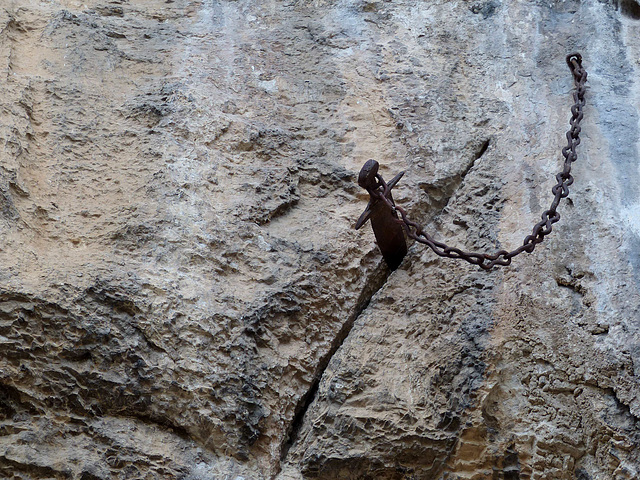Rocamadour - Vierge noire
Rocamadour
Laramière - Prieuré
Marcilhac-sur-Célé - Abbaye Saint-Pierre
Marcilhac-sur-Célé - Abbaye Saint-Pierre
Marcilhac-sur-Célé - Abbaye Saint-Pierre
Marcilhac-sur-Célé - Abbaye Saint-Pierre
Marcilhac-sur-Célé - Abbaye Saint-Pierre
Marcilhac-sur-Célé - Abbaye Saint-Pierre
Rignac - Saint-Germain
Rocamadour (Lot, Midi-Pyrénées)
Rocamadour (Lot, France)
Rocamadour
Rocamadour
2008-10-05-(51)-web
Location
See also...
Keywords
Authorizations, license
-
Visible by: Everyone -
All rights reserved
-
424 visits
Rocamadour - Durendal


Since my first visit, Rocamadour is one of my favourite places. In 2009, when I followed the Via Podensis, I took a detour, to reach Rocamadour by foot, like so many pilgrims since medieval times.
Rocamadour attracted pilgrims over centuries and hass a legend, similar to that of Santiago de Compostella . Here in 1166 the grave of St. Veronica´s husband Zacchaeus the Tax Collector (Luke 19) was found. He had moved from Jerusalem to this place in Gaul / France in his older age and lived here as a hermit under the name of Amadour.
The medieval pilgrims climbed up the 216 steps to the sanctuary, a cluster of churches and chapels, on their knees. Here is "Notre Dame de Rocamadour" (aka "La Vierge Noire", "Black Madonna of Rocamadour", "Our Lady of Rocamadour"..). Near the chapel they could see a sword sticking in the cliff. The legend told, that this was the magical sword Durendal.
Durandal manufactured by Wayland the Smith (aka "Völund") and given to Charlemagne by an angel. Charles endowed the sword to his palladin Roland (aka Errolan, Roldán, Orlando, Rotllà). Roland was killed by Basques near Roncevalles on the return from Spain ("Battle of Roncevaux Pass"). He had battled the Maurs with Charemagne´s armee. To preserve his sword Durendal (containing a tooth of Saint Peter) from heathenly hands, he threw it over a distance of about 400kms to Rocamadour, where it still sticks in the cliff today....
Pilgrims seeing the sword knew the whole "story" from "The Song of Roland" ("Chanson de Roland"), the oldest surviving major work of French literature.
Rocamadour attracted pilgrims over centuries and hass a legend, similar to that of Santiago de Compostella . Here in 1166 the grave of St. Veronica´s husband Zacchaeus the Tax Collector (Luke 19) was found. He had moved from Jerusalem to this place in Gaul / France in his older age and lived here as a hermit under the name of Amadour.
The medieval pilgrims climbed up the 216 steps to the sanctuary, a cluster of churches and chapels, on their knees. Here is "Notre Dame de Rocamadour" (aka "La Vierge Noire", "Black Madonna of Rocamadour", "Our Lady of Rocamadour"..). Near the chapel they could see a sword sticking in the cliff. The legend told, that this was the magical sword Durendal.
Durandal manufactured by Wayland the Smith (aka "Völund") and given to Charlemagne by an angel. Charles endowed the sword to his palladin Roland (aka Errolan, Roldán, Orlando, Rotllà). Roland was killed by Basques near Roncevalles on the return from Spain ("Battle of Roncevaux Pass"). He had battled the Maurs with Charemagne´s armee. To preserve his sword Durendal (containing a tooth of Saint Peter) from heathenly hands, he threw it over a distance of about 400kms to Rocamadour, where it still sticks in the cliff today....
Pilgrims seeing the sword knew the whole "story" from "The Song of Roland" ("Chanson de Roland"), the oldest surviving major work of French literature.
- Keyboard shortcuts:
Jump to top
RSS feed- Latest comments - Subscribe to the comment feeds of this photo
- ipernity © 2007-2024
- Help & Contact
|
Club news
|
About ipernity
|
History |
ipernity Club & Prices |
Guide of good conduct
Donate | Group guidelines | Privacy policy | Terms of use | Statutes | In memoria -
Facebook
Twitter

Sign-in to write a comment.